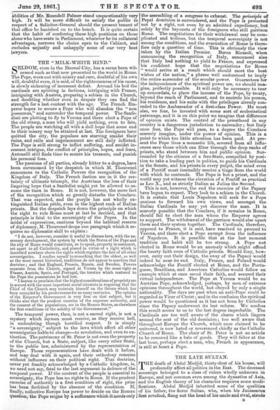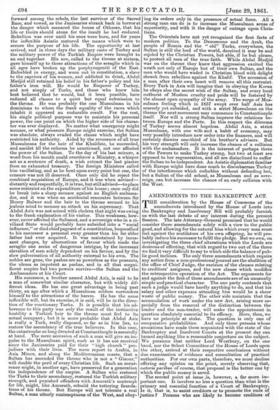THE LATE SULTAN.
THE death of Abdul Medjid, thirty-first of his house, will profoundly affect all politics in the East. The deceased sovereign belonged to a class of rulers wholly unknown in Europe, and not common even among the dynasties of Asia, and the English theory of his character requires some modi- fications. Abdul Medjid inherited some of the qualities of his father, the fierce Sultan, who, when his Janissaries first revolted, flung out the head of his uncle and rival, strode forward among the rebels, the last survivor of the Sacred Race, and vowed, as the Janissaries shrank back in horror at the danger which menaced the house of Othman, that his life or theirs should atone for the insult he had endured. Rebellion was over until his eons were born, and for years the inflexible Asiatic matured the means which were to secure the purpose of his life. The opportunity at last arrived, and in three days the military caste of Turkey and the military power of the Turkish Empire were brought to an end together. His son, called to the throne at sixteen, gave himself up to those attractions of the seraglio which in all ages have broken up the porphyrogeniti of the East. Enfeebled in energy, and worn out in constitution, a slave to the caprices of his women, and addicted to drink, Abdul Medjid still retained his belief in his father's policy and his father's iron will. He would be Emperor of Turkey, and not simply of Turks, and those who knew him best believed that he would, had it been possible, have reduced all classes to a quiet but equal submission to the throne. He was probably the one Mussulman in his dominions to whom the frank equality of the races which inhabit it appeared an endurable result. For the rest, his single political purpose was to maintain his personal power, the one point on which the higher side of his charac- ter was ever displayed. No matter what emergency might menace, or what pressure Europe might exercise, the Sultan was absolute, always evaded the clause which might have restricted his authority. Aided by the reverence of all true Mussulmans for the heir of the Khalifate, he succeeded, and amidst all the reforms he sanctioned, not one affected the power of the Sultan. To the day of his last seizure, a word from his mouth could overthrow a Ministry, a whisper act as a sentence of death, a wish extract the last piastre from an exhausted treasury. The foreign Ministers called him vacillating, and as he bent upon every point but one, the censure was not ill deserved. Once only did he reject the combined requisition of Europe, and it was when advised— distantly and respectfully, it is true, but still advised—to place some restraint on the expenditure of his house; once only did he break into a sharp menace against an English ambassa- dor, and it was when an accidental rencontre between Sir Henry Bulwer and the heir to the throne seemed to his jealous mind to menace an attack on his supremacy. That Abdul Aziz was not seized with cholera that night was owing to the frank explanation of his visitor. This weakness, how- ever, never affected the Sultanut, and a sovereign who in a ci- vilized State would probably have subsided into a " social influence," or died chief pageant of a constitution, bequeathed to his successor a personal sway greater than his far abler father had ever acquired. It was maintained by inces- sant changes, by alternations of favour which made the seraglio one scene of dangerous intrigue, by the incessant elevation of men solely dependent on his favour, and by the slow pulverisation of all authority external to his own. 'The nobles are gone, the pashas are as powerless as the peasants, the ulema as impotent as pashas, and in all that magni- ficent empire but two powers survive—the Sultan and the Ambassadors at his Court.
His successor, a brother named Abdul Aziz, is said to be a man of somewhat similar character, but with widely dif- ferent ideas. He has one great advantage in being past thirty, an age after which a Mussulman seldom surrenders himself to the attractions of the harem. He has the same inflexible will, but its exercise, it is said, will be in the direc- tion of the reactionary Turks. It is possible that his ad- herence to this party was only the result of the instinctive hostility a Turkish heir to the throne must feel to its actual occupant ; but it is more probable that Abdul Aziz is really a Turk, really disposed, so far as in him lies, to restore the ascendancy of the true believers. In this case, the catastrophe so long dreaded at Constantinople is assuredly at hand. The mere accession of such a man will give an im- pulse to the Mussulman spirit, such as it has not received since the Janissaries paid for their " high church " pre- judices with their lives. The mere report in Arabia, in Asia Minor, and along the Mediterranean coasts, that a Sultan has ascended the throne who is not a " Giaour," will double the peril of every Christian life. Such an occur- rence might, in another age, have preserved for a generation the independence of the empire. A Sultan who restored the Turks to their ascendancy, restored the Turkish military strength, and punished offenders with Amurath's contempt for life, might, like Amurath, rebuild the tottering founda- tions of his throne. But Europe will not tolerate a real Sultan, a man utterly contemptuous of the West, and obey- ing its orders only in the presence of actual force. All a strong man can do is to increase the Mussulman sense of superiority, and with it the danger of outrage upon Chris- tians.
The Orientals have not yet recognized the first facts of modern politics. To the Damascene and the Arab, the people of Bosnia and the " old" Turks, everywhere, the Sultan is still the lord of the world, deceived it may be and cajoled by the Christian Powers, but able, if he but please, to protect all men of the true faith. While Abdul Medjid was on the throne they knew that aggression excited the wrath not only of Europe but of their own Sultan, and the " men who would have waded in Christian blood with delight shrank from rebellion against the Khalif. The accession of a man after their own heart will remove all this restraint. Every Turk in Asia will imagine that in obeying the Koran he obeys also the secret wish of the Sultan, and every local outburst of Moslem cruelty and pride will be fostered by the almost open sympathy of the army. The surge of Mus- sulman feeling which in 1857 swept over half Asia has scarcely yet subsided, and with a strict Mussulman on the throne the next movement may commence in Constantinople itself. Nor will a strong Sultan improve the relations be- tween Europe and the Porte. In this respect the dilemma of Turkey seems almost hopeless. Abdul Aziz, a strict Mussulman, with one wife and a habit of economy, may verrpossibly introduce new order into the finances, and will certainly dismiss one-third of his brother's advisers. But his very strength will only increase the chance of a collision with the ambassadors. It is the interest of perhaps three of the Powers to make Turkey strong, but two at least are opposed to her regeneration, and all are disinclined to suffer the Sultan to be independent. An Asiatic diplomatist familial. with Europe might have done much to disembarrass Turkey of the interference which enfeebles without defending her, but a Sultan of the old school, as Mussulman and as sove- reign, can but increase the chance of an early collision with the West.































 Previous page
Previous page